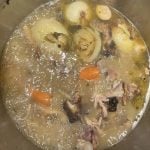MERRICKVILLE, Ont. – On their small, organic, free range farm south of Ottawa, Scott and Suzie Kelland take care of five Lac La Croix ponies that are five percent of the world’s remaining herd of this sturdy historic Canadien-Spanish Mustang cross.
A small herd of British Large Black pigs, a heritage breed, roam the old-fashioned 52 acre farm that has only 15 acres cleared.
A few Horned Dorset sheep, another heritage breed, roam the farm along with a small flock of heritage breed layer hens.
But the Kelland farm is no hobby farm for eccentric back-to-the-land dreamers.
Read Also

Rural emergency room closures continue to be vexing problem
Staffing issues are at the root of disruptions and closures in hospital emergency departments, both in rural and urban Canadian locations.
This is a farm the couple bought in 2000 when they moved from a home in central Ottawa. They experimented for several years with different products and last year produced their first harvest of organic vegetables and meat for local consumers.
With gross sales of $15,000 in the first year, co-owner Scott Kelland, 48, says they netted $1,000. Family income came almost entirely from his part-time job as a business consultant, often dealing with federal government departments.
This year, the Kellands plan to increase gross sales to $50,000 and hope to net $15,000.
By next year, the plan is $100,000 in gross revenues and net revenue of up to $35,000.
Within six years, he expects to be running a $250,000 operation with net family income in the high tens of thousands. By then, he expects to all but phase out his consulting business, concentrating on his farm business and an exit plan in his mid-50s.
These are not the unsupported ravings of a naïve new farmer with dreams of success on a small farm where others have fallen short of profits. These are the business plans of a couple with an extensive spreadsheet business plan and what Scott considers an almost foolproof model.
It is impressive enough that after one year in business, the Ontario government gave New Terra Farm a $5,000 award for agricultural innovation in May, one of 55 farms recognized in the province.
Kelland’s model is simple and forward thinking, based on a community supported agriculture model first developed in Japan and now embraced around the world as a way to encourage consumption of local food and build a relationship between food producers and their customers.
New Terra Farms plants the vegetables that its customers want and agree to buy. Before planting, families within a 30 kilometre radius of the farm sign up, pay a portion of the $850 annual fee and in return are promised a weekly basket of organic vegetables sufficient to feed a family of four.
Kelland also offers organic eggs, lamb and pork and has an arrangement with an organic herb producer and an organic beef producer to provide products.
The basket is delivered to customers’ doors each week.
As well, Kelland plans to open a storefront operation to sell desserts and other value-added products from organic produce.
“We call this a bootstrap operation because we really began with nothing and the first year, our costs were paid by people who subscribed,” Kelland said. “We don’t come from a specific farm background and I think anyone can do this with imagination and energy. You can make a small farm pay.”
It also helps that the farm is located in an area of eastern Ontario populated by artists, affluent commuters with an environmental conscience and the money to salve it and restaurants committed to using local produce when possible.
“We’re not interested in big farming or commodity production,” he said. “I net out my costs plus a profit and tell people this is what I can grow and this is what I charge. Luckily, people have been signing up. Playing the commodity game of a race to the price bottom is a mug’s game.”
His involvement with the Lac La Croix ponies helped push the couple to the farm.
They had been looking for a small farm and Scott was involved in the Canadian Organic Growers group while still working as a consultant in Ottawa.
But his Newfoundland roots made him interested in the endangered Newfoundland pony and he became active in and later chair of Rare Breeds Canada.
When a small herd of Lac La Croix ponies from the United States was being liquidated in the late 1990s, he took two but obviously couldn’t keep them in his Ottawa house. They were housed at the Agriculture Museum on the Agriculture Canada site for several years.
“But I wanted a place for them and that really was an impetus to find this farm and move out of the city,” he said.















